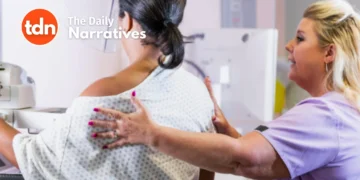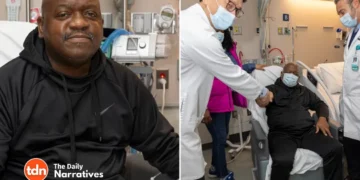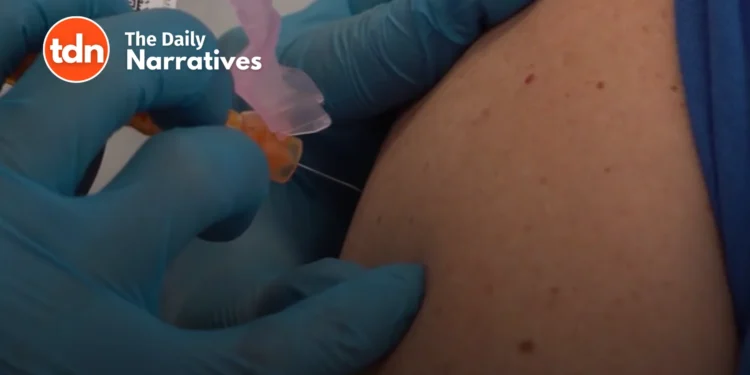During a consultation, at the University College Hospital Macmillan Cancer Centre in London Consultant Dr. Heather Shaw discussed the MRI of patient Steve Youngs brain displayed on the screen. A groundbreaking personalized cancer vaccine for melanoma with applications for lung, bladder and kidney cancers is currently undergoing trials in British patients.
This innovative vaccine, tailored to each individual within a timeframe instructs the body to target cancer cells and prevent their resurgence. In a phase 2 trial involving companies Moderna and MSD the vaccine showed promise in reducing the risk of melanoma recurrence. A phase 3 trial led by University College London Hospitals NHS Foundation Trust (UCLH) is now underway to evaluate its efficacy.
Dr. Heather Shaw, the coordinating investigator for this trial expressed optimism about the vaccines potential to cure melanoma patients and its exploration in treating other types of cancer.
In an interview, with the PA news agency to discuss trial specifics Dr. Shaw described this development as one of the promising advancements seen in recent times; this tool is meticulously designed. Tailored specifically for each patient. Patients are genuinely enthusiastic about them.
The new treatment is a neoantigen therapy (INT) also known as a cancer vaccine.
It aims to activate the system to combat the patients form of cancer and tumor.
Referred to as mRNA 4157 (V940) this treatment is designed to target tumor neoantigens found in an individuals tumors.
These are markers on the tumor that could potentially be recognized by the system.
The treatment contains information for up to 34 neoantigens. Stimulates an immune response against tumors based on the specific mutations, in a patients cancer cells.
To develop this treatment a sample of the tumor is taken during surgery followed by DNA analysis and leveraging intelligence technology.
The end result is a customized cancer treatment tailored to each patients tumor.
Dr. Shaw emphasized the nature of this therapy highlighting its tailored approach, for each patient. Unlike a vaccine, which’s more generalized this treatment is specifically designed to target antigens unique to each patients tumor. The goal, as Dr. Shaw explained is to eradicate cancer in patients.
The focus is on preventing any recurrence of the disease by addressing cancer cells that may not be detectable through imaging scans. By providing treatment to eliminate these lingering cells on a case, by case basis the objective is to increase the number of patients who remain cancer free in the term ultimately leading to improved overall survival rates and a reduced likelihood of cancer returning.
Phase 2 findings, released in December indicated that individuals, with high risk melanomas who were administered both the vaccine and Keytruda immunotherapy from MSD had lower mortality rates and cancer recurrence rates after three years compared to those who solely received Keytruda. Patients underwent a treatment regimen involving doses of the mRNA vaccine and Keytruda over specified durations.
The upcoming phase 3 trial will encompass a population with an anticipated enrollment of approximately 1,100 participants globally. In the UK segment of the trial efforts are underway to enlist 60 to 70 patients across centers in cities such as London, Manchester, Edinburgh and Leeds. Additionally this combined therapy approach is being explored in treating lung, bladder and kidney cancers.
Steve Young from Stevenage was among the participants at UCLH for this trial. His standing bump on his head turned out to be melanoma upon diagnosis—a revelation that left him shocked and contemplative, about his health journey ahead.
“My father passed away, from emphysema at the age of 57 and it made me think that I might not live long as he did ” shared Mr. Young when he learned about the trial at UCLH, which instantly caught his interest.
Dr. Shaw also shared optimism stating, “I believe these treatments could revolutionize immunotherapy. We have been searching for an approach to our existing life changing immunotherapies with side effects and these therapies seem to hold that promise.”
Regarding side effects Dr. Shaw mentioned ones like fatigue and arm soreness, at the injection site.
“It seems like most patients find it bearable, not different, from getting a flu shot or a Covid vaccine ” she mentioned.
Professor Lawrence Young, a faculty member at the University of Warwick expressed his enthusiasm about this advancement in cancer treatment.
The combination of a cancer vaccine to enhance the body’s response to the patients tumor along with an antibody to unleash the immune systems potential has shown promising results in patients who had melanoma removed.
Recent advancements in understanding how the body regulates responses and the availability of vaccines have reignited interest in cancer vaccines. This makes developing a vaccine tailored to a patients tumor profile
Vassiliki Karantza, a VP at MSD Research Laboratories emphasized their commitment to advancing research for cancer treatments at early stages for maximum benefit, to patients.
There is hope that this strategy could be applied to types of cancers like lung and colon cancers.
“We are showcasing our commitment, to improving therapies for individuals with melanoma and we are excited, about broadening our extensive clinical research program to include more types of tumors.”
















































